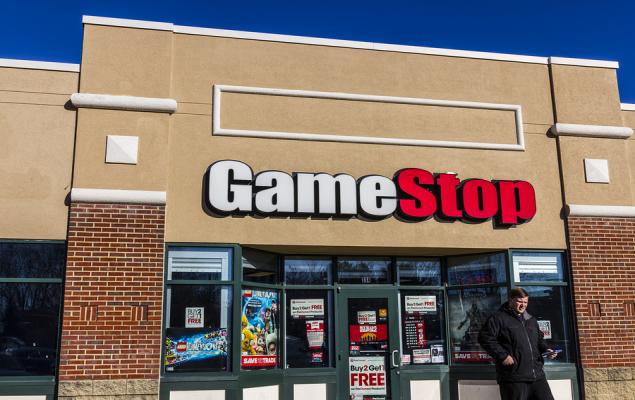How To Trade GameStop Trading Frenzy With ETFs

Image: Bigstock
The world's largest video game retailer — GameStop (GME - Free Report) — has become one of the most heavily traded stocks of this year. After an epic rally of more than 1,700% since Jan 12, the stock frenzy hit brakes following trading restrictions on platforms such as Robinhood Markets and Interactive Brokers Group. As such, the news triggered a plunge of more than 44% in the stock on the Jan 28 trading session, wiping out nearly $11 billion in market value.
Robinhood blocked clients from making new purchases, only allowing them to sell their existing positions while Interactive Brokers put GameStop option trading into liquidation due to the "extraordinary volatility in the markets." E*Trade Financial also prevented customers from purchasing shares of the company. Webull, another trading app, said customers could only liquidate positions that they already had in GameStop. The move comes a day after TD Ameritrade became the first online broker to place restrictions on the trading of the video game retailer.
Further, the social media trading frenzy has attracted regulatory scrutiny from the U.S. Securities and Exchange Commission. However, GameStop shares rebounded in the pre-market today after Robinhood said it would “allow limited buys of these securities.”
Inside the GameStop Crazy Run
The dramatic jump in GameStop is a result of an extraordinary frenzy spurred by social media posts from prominent CEOs and Internet influencers as well as a hedge-fund-driven short squeeze. In particular, Reddit’s “Wall Street Bets” forum popularized the stock as a value investment that pushed GME shares to as high as $483 from $18.84 at the start of the year, sending market capitalization to $25 billion.
Notably, short squeeze is a term used by market participants to refer to a phenomenon where short sellers in a stock who have placed their bets on a stock’s fall, rush to hedge their positions or buy the stock in the event of an adverse price movement, in order to cover their losses.
This leads to a sharp rise in demand for the share and a huge rally in share prices.
With the surge, the stock is now bigger than more than a third of the companies in the S&P 500 Index. GameStop has become the biggest stock on the Russell 2000 Index of small caps, according to Zerohedge.
The outsized move in GameStop stock in a very short time has led to a reshuffle in many ETF portfolios. Below, we highlight five ETFs having the largest allocation to this video game retailer, which may materially change the fund performance until rebalancing occurs:
Wedbush ETFMG Video Game Tech ETF (GAMR - Free Report)
This ETF offers exposure to the companies involved in the video game technology industry —game developers, console and chip manufacturers, and game retailers — by tracking the EEFund Video Game Tech Index. It holds 93 stocks in its basket with GameStop occupying the top position at 27%. The fund has amassed $174.4 million in its asset base and charges 75 bps in annual fees. It trades in volume of about 32,000 shares a day on average. It has gained 24% in the first month of this year.
SPDR S&P Retail ETF (XRT - Free Report)
With AUM of $709.5 million, this product targets the broad retail sector by tracking the S&P Retail Select Industry Index. It holds 94 securities in its basket with GameStop as the top firm accounting for 12.4% of the portfolio. The ETF has key holdings in Internet & direct marketing retail, automotive retail, apparel retail, computer & electronics retail, and specialty stores. The fund charges 35 bps in annual fees and trades in an average daily volume of around 3.8 million shares. It has surged 29% so far this year and carries a Zacks ETF Rank #2 (Buy) with a Medium risk outlook.
Invesco S&P SmallCap Value with Momentum ETF (XSVM - Free Report)
This fund offers exposure to the companies having the highest "value scores" and "momentum scores" by tracking the S&P 600 High Momentum Value Index. It holds a basket of 121 stocks with GME taking the top spot at 9.1% of assets. The ETF has accumulated $132.1 million in its asset base and charges 39 bps in annual fees. It trades in a lower volume of 33,000 shares per day on average and has gained about 19% in the first month of this year. XSVM has a Zacks ETF Rank #3 (Hold).
Invesco S&P SmallCap 600 Revenue ETF (RWJ - Free Report)
This product offers exposure to securities of the S&P SmallCap 600 but is weighted by revenues instead of market capitalization. It is home to 598 securities with GameStop occupying the top position at 7.9% allocation. From a sector look, consumer discretionary makes up for the largest share at 33.8% followed by industrials (16.2%). RWJ has AUM of $367.8 million and an expense ratio of 0.39%. It trades in an average daily volume of about 31,000 shares and has added about 21% in the same time frame. The product has a Zacks ETF Rank.
Invesco S&P SmallCap Consumer Discretionary ETF (PSCD - Free Report)
This ETF offers broad exposure to the consumer discretionary sector and follows the S&P SmallCap 600 Capped Consumer Discretionary Index. It holds 91 securities in its basket with GME taking the top spot at 7.3% of assets. Specialty retail takes the largest share at 34.5% while household durables, hotels, restaurants and leisure, and textile, apparel & luxury goods account for a double-digit exposure each. The product has attracted $36 million in AUM while seeing a paltry volume of 7,000 shares per day. The ETF charges 29 bps in annual fees and has a Zacks ETF Rank #2 with a High risk outlook. It is up nearly 22% so far this year.
Disclosure: Zacks.com contains statements and statistics that have been obtained from sources believed to be reliable but are not guaranteed as to accuracy or completeness. References to any ...
more


